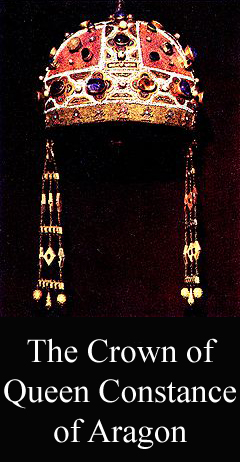The friction which developed
between the Crown of Aragon and the Angevin Empire was in part due to
Charles of Anjou's interference in what the Catalans and the crown
considered to be their sphere of influence and economic affairs.
 But, a large part of the antagonism was caused by dynastic and even
familial considerations. The House of Aragon had a long history in Sicily
beginning with the marriage of Constance of Aragon to Frederick II in 1209.
Her crown shows the Byzantine influence still in Sicilian culture at that time (left).
The connection between Aragon and Sicily was renewed when James I
married his son Peter to
Constance of Hohenstaufen,
the daughter of Manfred in 1261, a marriage opposed by the Holy See. After Conradin's
death in 1268, Peter asserted his claim to the throne of the Kingdom of
Sicily and appears to have engaged in a number of diplomatic maneuvers in
Germany and Lombardy to strengthen his claim.
But, a large part of the antagonism was caused by dynastic and even
familial considerations. The House of Aragon had a long history in Sicily
beginning with the marriage of Constance of Aragon to Frederick II in 1209.
Her crown shows the Byzantine influence still in Sicilian culture at that time (left).
The connection between Aragon and Sicily was renewed when James I
married his son Peter to
Constance of Hohenstaufen,
the daughter of Manfred in 1261, a marriage opposed by the Holy See. After Conradin's
death in 1268, Peter asserted his claim to the throne of the Kingdom of
Sicily and appears to have engaged in a number of diplomatic maneuvers in
Germany and Lombardy to strengthen his claim.
Not only did the marriage ally the Crown of Aragon with the nominal king of Sicily, Manfred of Lancia, but it also immediately connected the crown to one of the most influential families in Sicily and southern Italy. The marriage also proved beneficial to the Lancias, and resulted in Frederick of Lancia's appointment as an ambassador to Tunis and Conrad of Lancia's rise to Admiral of the Aragonese fleet in 1268. Probably the most influential person at court, besides the queen, was John of Procida, doctor to Frederick II and Chancellor of Sicily under Manfred. Shortly after the ascension of Peter III to the throne, John of Procida was named Chancellor of Aragon, which gave him control over the foreign policy of the kingdom. While legends that Peter sent John of Procida to Constantinople and secretly to Sicily appear to be inaccurate, John was in contact with the Byzantine emperor, the Genoese and other groups in an effort to undermine Charles of Anjou. The king and these influential persons in the king's court now had a vested interest in seeing Charles of Anjou ousted from the Regno. What is not clear is the relationship between the newcomers and the Aragonese nobility at court. The machinations of the Procidas and Lancias may have been resented, and this feeling was expressed later in the nobility's increasing opposition to the Sicilian war following the start of hostilities and their demand in 1283 that all officials not born in Aragon be dismissed.


